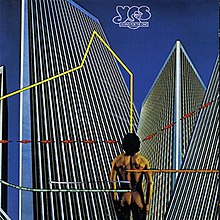Going for the One
| Going for the One | ||||
|---|---|---|---|---|
 |
||||
| Studio album by Yes | ||||
| Released | 15 July 1977 | |||
| Recorded | 1976–1977 | |||
| Studio |
Mountain Studios (Montreux, Switzerland) |
|||
| Genre | Progressive rock | |||
| Length | 38:49 | |||
| Label | Atlantic | |||
| Producer | Yes | |||
| Yes chronology | ||||
|
||||
| Singles from Going for the One | ||||
|
||||
| Professional ratings | |
|---|---|
| Review scores | |
| Source | Rating |
| Allmusic | |
| Robert Christgau | (C) |
| Pitchfork Media | (7.5/10) |
| Rolling Stone | (favourable) |
Going for the One is the eighth studio album by the English rock band Yes, released on 15 July 1977 by Atlantic Records. The album was recorded in Montreux, Switzerland after the band took a break in activity for each member to release a solo album and their 1976 North American tour. It marks the departure of keyboardist Patrick Moraz and the return of Rick Wakeman, who had left to pursue his solo career after musical differences surrounding Tales from Topographic Oceans (1973). In a departure from their previous three albums, Going for the One features shorter and more direct songs written without a unifying theme or concept, and saw Yes record with new producers, engineers and cover designers.
Going for the One received a mostly positive response from music critics who welcomed the band's return to more accessible music like their earlier albums The Yes Album (1971) and Fragile (1971). It was a commercial success and reached number one on the UK Albums Chart, their second album to do so, for two weeks and peaked at number 8 on the US Billboard 200. "Wonderous Stories" and "Going for the One" were released as singles; the former went to number 7 in the UK which remains the band's highest charting single. Going for the One was certified gold by the Recording Industry Association of America (RIAA) for 500,000 copies sold in the US. A remastered edition was released in 2003 that contains several previously unreleased tracks from the album's recording sessions. Yes supported the album with a six-month tour of North America and Europe.
In August 1975, Yes wrapped their 1974–75 tour of North America and the United Kingdom in support of their seventh studio album, Relayer (1974). The line-up during this time was lead vocalist Jon Anderson, bassist Chris Squire, guitarist Steve Howe, drummer Alan White, and keyboardist Patrick Moraz. For their next move, the group decided to take an extended break so each member could record and release a solo album. They regrouped in early 1976 for their 1976 tour of North America from May to August, which saw Yes perform some of their highest attended concerts. By October 1976, they had become tax exiles and relocated to Montreux, Switzerland to record a new studio album at Mountain Studios, their first studio album recorded overseas. Upon their arrival, Emerson, Lake & Palmer were supposed to have finished recording Works (1977) at the studio but they were running overtime, leaving Yes to work at a nearby rehearsal space for several weeks. A substantial amount of writing and arranging was done during this time.
...
Wikipedia
